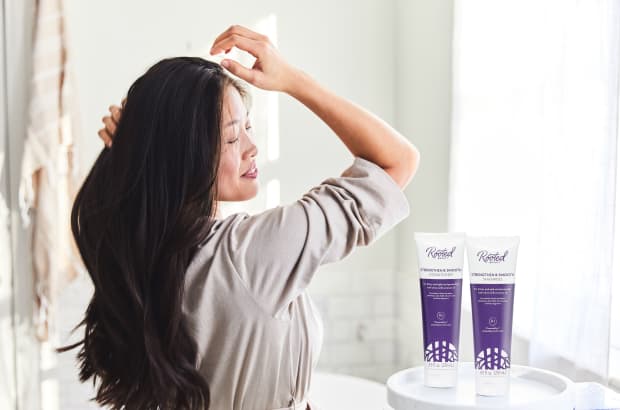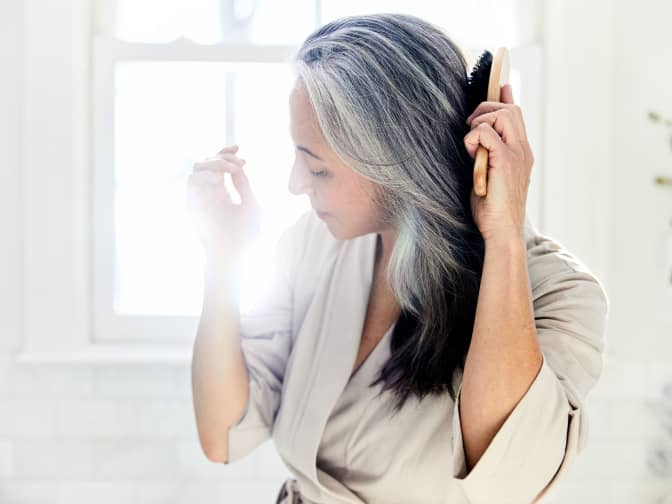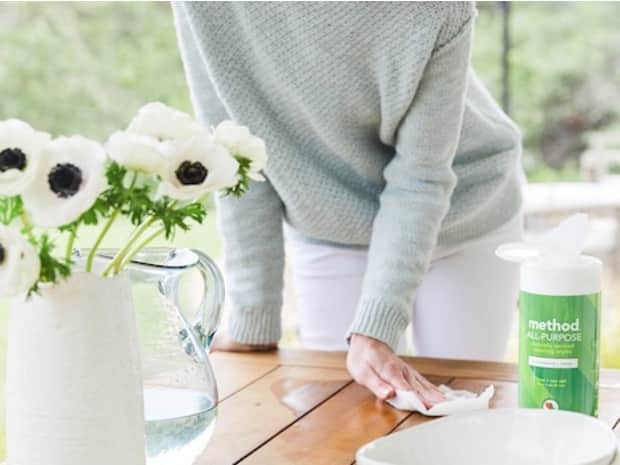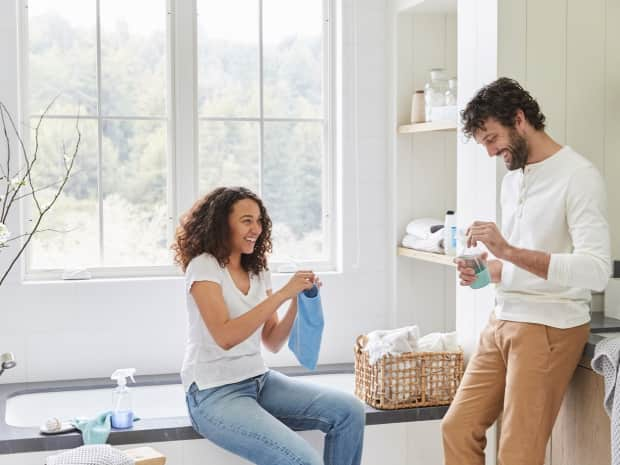
What are the best natural shampoos & conditioners?
Last Updated: June 30, 2022
Looking to change to natural hair care? We've got you covered! Read on for our guide to learn more about natural hair products and about the best natural shampoo and conditioners.
- What are the best natural shampoos & conditioners?
- Why are sulfates and parabens so bad?
- Shop sulfate-free shampoos from Grove.
- What are other hair care ingredients to avoid?
- What are the benefits of using natural shampoos and conditioners?
- What are the best natural hair care ingredients to look for?
- What are the best natural hair care brands?
- What to expect when you make the switch to natural hair products
- What are the best natural shampoos and conditioners for each hair type?
- Shampoo and conditioner for dry hair.
- Shampoo and conditioner for flat hair
- Shampoo and conditioner for oily hair
- Shampoo and conditioner for curly hair.
- Shampoo and conditioner for color-treated hair.
- Shampoo and conditioner for dandruff and frizz.
- A few more tips for using natural shampoo
- Read more from Grove.
Here at Grove Collaborative, we’re big believers in the power of natural products — both for ourselves and for the planet. But we know making the switch to natural can be daunting, especially if you’re accustomed to conventional products and are new to the world of natural, eco-friendly alternatives.
Plus, giving your hair-washing routine a second thought could result in better-looking, healthier hair—and a cleaner environment.
Natural shampoos and conditioners don’t have the harsh ingredients that conventional products do, such as sulfates and parabens. They also don’t pollute the environment with toxic substances that affect our water and wildlife. Made from naturally derived ingredients, natural shampoos and conditioners are a great choice for people trying to reduce their exposure to harmful chemicals or improve the health of their hair.
Read on to learn more about the best ingredients for your hair, plus browse our list of the best natural shampoo and conditioners based on your hair needs.
Why are sulfates and parabens so bad?
Sulfates are surfactants, or detergents, that remove dirt and oils and make it possible for a product to lather. The most commonly found sulfates in conventional shampoo and conditioners are sodium lauryl sulfate (SLS) and sodium laureth sulfate (SLES), which are petroleum-based.
So what’s the big deal?
While sulfates aren’t linked to health problems, they can cause varying degrees of eye and skin irritation and are particularly hard on the health of your hair. Because sulfates are such effective detergents, they strip a lot of the natural oils from your locks, leaving them rough, dry, and brittle.
Over time, sulfates build up on the hair shaft and block natural oils from coating it altogether. Oil also pools at the roots, making your hair look dull and greasy. Sulfates can also irritate your scalp and cause acne on your back or hairline.
Grove Tip
What is sulfate-free shampoo?
Sulfate-free shampoo contains plant-based ingredients that gently remove dirt from your hair without taking all the good stuff with it. Sulfate-free shampoo is also safe for dyed hair, since it doesn’t strip away all your color when you wash with it.

What’s the problem with parabens?
Parabens are artificial chemicals and preservatives that accumulate in fat tissue over time, and can irritate your skin — especially if you have sensitivities.
But the real danger is that these are endocrine-disrupting chemicals, which means they disrupt the hormone systems involved in reproduction. Overexposure to parabens can affect testosterone levels, sperm count, the menstrual cycle, and birth outcomes. The environment also feels the effects of parabens, which have been detected in surface waters and can kill coral.
What are other hair care ingredients to avoid?
Sodium chloride (salt)
- Dries your scalp
- Dehydrates your hair strands
- May cause hair loss
Quaternium-15 (formaldehyde)
- Carcinogenic
- Absorbed through the skin
- May cause skin rashes and inflammation
Synthetic fragrances
- Contain toxic chemicals
- Irritate the skin
- May cause hair loss
Dimethicone (silicone plastic)
- Contributes to product buildup
- Clogs your pores
- Weighs down your hair
What are the benefits of using natural shampoos and conditioners?
Natural ingredients promote hair growth
The natural plant oils and herbal extracts found in natural hair care products promote new hair growth by stimulating the hair follicles, moisturizing the strands, and improving the health of your scalp.Naturally-derived scents are non-allergenic
Natural shampoo and conditioner are non-allergenic and suitable for all types of skin and hair. Thanks to fragrant plant oils, natural hair products smell divine.Natural ingredients are also biodegradable
Biodegradable ingredients in natural shampoos and conditioners don’t pollute the water, and they’re more eco-friendly to produce.What are the best natural hair care ingredients to look for?
Coconut oil
It moisturizes the scalp, fights fungus, and protects your hair from heat damage.Cold-pressed olive oil
It improves elasticity and is rich in vitamin E and antioxidants.Shea butter
It provides shine and enhances color.Jojoba oil
It moisturizes, soothes, and promotes hair cell growth, and it has antibacterial properties.Castor oil
It has antibacterial and antifungal properties. Omega-9 fatty acids nourish hair and keep it soft and shiny.Aloe vera
It reduces scalp inflammation and gently removes excess oil without damaging hair.Peppermint
It improves blood flow to the scalp, reduces inflammation, and promotes hair growth.What are the best natural hair care brands?
At Grove, we handpick our products not only for their quality and effectiveness, but also for the brand’s social and environmental stewardship.
Aside from our flagship Rooted Beauty line (Hey, we’re partial!), which includes shampoos and conditioners designed to hydrate and repair, and our Peach not Plastic shampoo and conditioner bar products, here are three other natural hair care companies we’re excited about.
HiBAR
HiBAR’s line of waterless hair shampoo and conditioner bars not only have no nasty ingredients, but they also have no plastic packaging.
Several of HiBAR’s shampoo and conditioner bars made our list of the 9 Best Shampoo and Conditioner Bars that were top-rated by actual Grove members.
Acure
Acure’s products are totally free of dangerous and damaging ingredients, and its products are 100-percent vegan and never tested on animals.
Acure not only makes hair care but also natural skincare too. You can browse the top 21 best Acure skincare and hair care products, rated by actual Grove members, here.
Alba Botanica
Alba Botanica’s personal care products treat your body and the earth kindly.
Along with fruit extracts for amazing scents, Alba Botanica’s hair care products feature botanical cleansers that gently remove environmental pollutants, dust, and oil.
What to expect when you make the switch to natural hair products
Fewer bubbles
Because organic shampoo doesn’t contain chemical foaming agents, like sulfates, it won’t lather up like it does on TV. But that doesn’t mean it’s not removing dirt and buildup from your hair.
Lather up twice
Maybe you always rinse and repeat, but you’ll want to be sure to shampoo twice with all-natural products for the best results. Be sure to rinse your hair well too.
Adjustment period
It may take a few washings for your scalp to adjust. Your hair may feel oilier or heavier than usual, but give it a little time, and your hair will feel and look better than ever.
Better hair growth
A healthy scalp naturally promotes hair growth.
Natural products are packed with vitamins and antioxidants that nourish your scalp. Some plants, like peppermint,, specifically boost growth.
What are the best natural shampoos and conditioners for each hair type?
Dry and damaged hair
No matter what type of hair you have, we can recommend some great natural products that will bring out the best. Browse through some of our natural favorites below.
A few more tips for using natural shampoo
More isn’t better
Since natural shampoo doesn’t lather as robustly as their conventional counterparts, you may feel like you need more, but you really don’t.
Not too hot
Very hot water can damage your hair and cause frizz. Use very warm water while you wash to open up the cuticles, and rinse with cool water to close them.
Massage your scalp
While you shampoo, give that scalp of yours a deep massage with your fingertips to stimulate hair follicles and prevent the buildup of sebum.
Rinse thoroughly
Even natural products can leave residue on your hair if you don’t thoroughly rinse it. When you think you’re done rinsing, rinse a little more.
Squeeze dry
The worst thing you can do after shampooing is scrub your hair dry with a towel. Instead, use the towel to gently squeeze and dab at your hair.
Read more from Grove.

The Germiest Household Items Most People Forget to Clean
The most overlooked things in your home you should be cleaning right now.
Read More

Spring Cleaning Checklist: Your Room-by-Room Guide
Follow our comprehensive checklist of totally tackle-able tasks to make your place shine.
Read More

Guide to Going Plastic-Free at Home
How to go plastic-free if you're just getting started — and how to level up if you're ready to make a commitment.
Read More

Beginner’s Guide to Menstrual Cups
These environmentally friendly and cost-effective feminine care items might just be your next sustainable swap.
Read More
